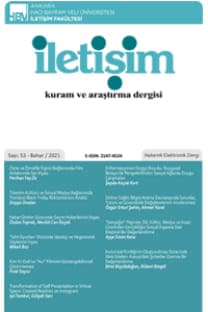Rethinking the Role of Media in the Outcome of 21. Century Conflicts: A Media-Policy Interaction Approach
Bu makalenin başlıca amacı, medyanın 21. yüzyıl çatışmalarının sonuçlarıüzerindeki rolünü, iki vaka ışığında incelemektir: ABDnin teröre karşı savaşı ve 2008- 2009 Gazze savaşı. Bu amaç doğrultusunda, bu çalışma ilk olarak Uluslararası çatışmalardamedya-siyaset ilişkisinde iki ana kuramsal yaklaşım olarak CNN etkisi ve Rıza İmalatıteorilerini eleştirel olarak değerlendirecektir. İkinci olarak çalışma, hem bu iki teoriarasındaki kuramsal tıkanıklığa bir çözüm, hem de medyanın 21. yüzyıl çatışmalarınınınsonuçlarını belirlemedeki rolüne yönelik kavramsal bir çerçeve olarak, meyda-siyasetetkileşim modelinin bir anlayışını sunacaktır. Son olarak medyanın 21. Yüzyıl çatışmalarınınsonuçlarını ne derecede belirlediği sorusu, ABDnin terörle mücadelesi ve 2008-2009Gazze savaşının medya-siyaset etkileşim modeli ışığında çözümlenerek cevaplanacaktır. e
21. Yüzyıl Çatışmalarının Sonuçları Üzerinde Medyanın Rolünü Yeniden Düşünmek: Medya-Siyaset Etkileşim Yaklaşımı
The primary objective of this article is to explore the role of media in the outcomesof 21st-century conflicts in the light of two cases: the War on Terror and the 2008-2009Gaza War. In line with this objective, this study first critically evaluates CNN effectand Manufacturing Consent theories as two main theoretical approaches to the media- politics relations in international conflicts. Secondly, it offers an insight into media-policyinteraction model both as a solution to the theoretical deadlock between these theories andas a conceptual framework for understanding the role of media in determining the outcomeof 21st-century conflicts. Lastly, the question of To what extent do the media determinethe outcome of 21st-century conflicts? is answered by analyzing media coverage of theWar on Terror and the 2008-2009 Gaza War in the light of media-policy interaction model.
___
- Altheide, David L., (2007). The mass media and terrorism, Discourse & Communication, Vol.1, No.3: 287308.
- Bahador, Babak, (2007). The CNN Effect in Action: How the News Media Pushed the West toward War in Kosovo, New York: Palgrave Macmillan.
- Balabanova, Ekaterina, (2007). Media, Wars and Politics Comparing the Incomparable in Western and Eastern Europe, Hampshire: Ashgate Publishing Limited.
- Bennett, W.Lance, (1990). Toward a theory of press-state relations in the United States, Journal of Communication, Vol.40, No.2: 103−127.
- Blumler, Jay G. and Michael Gurevitch, (2000). Rethinking the story of political communication J. Curran and M. Gurevitch (eds.), Mass Media and Society, London: Hodder Arnold Publication.
- Chomsky, Noam and Edward Herman, (1988). Manufacturing Consent: The Political Economy of the Mass Media, London: Vintage Books.
- Gilboa, Eytan, (2002). Global communication and foreign policy , Journal of Communication, Vol. 52, No.4: 731−748.
- Hoge, James F, (1994). Media pervasiveness. Foreign Affairs, Vol.73, No.3: 136−144.
- Jakobsen, Peter Viggo, (2000). Focus on the CNN effect misses the point: the real media impact on conflict management is invisible and indirect, Journal of Peace Research, Vol.37, No.2: 131−143.
- Kumar Deepa, (2006). Media, War, and Propaganda: Strategies of Information Management During the 2003 Iraq War, Communication and Critical/Cultural Studies, Vol.3, No.1: 48-69.
- Livingston, Steven and Todd Eachus, (1995). Humanitarian crisis and US foreign policy, Political Communication, Vol.12, No.5: 413−429.
- Livingston, Steven, (1997). Beyond the CNN effect: the media-foreign policy dynamic Pippa Norris (ed.), The news media and their influence, London: Lynne Rienner Publishers, Ch.12.
- Livingston, Steven, (2000). Media coverage of the war: an empirical assessment Albrecht Schnabel and Ramesh Thakur (eds.), Kosovo and the challenge of humanitarian intervention, New York: United Nations University Press, Ch. 23.
- Robinson, Piers, (1999). The CNN Effect: can the news media drive foreign policy? , Review of International Studies, Vol. 25, No.2: 301−309.
- Robinson, Piers, (2000a). World politics and media power: problems of research design , Media, Culture and Society, Vol.22, No.2: 227−232.
- Robinson, Piers, (2000b). The policy-media interaction model: measuring media power during humanitarian crisis , Journal of Peace Research, Vol.37, No.5: 613−633.
- Robinson, Piers, (2002). The CNN Effect: the Myth of News, Foreign Policy and Intervention, London and New York: Routledge.
- Shaw, Martin, (1996). Civil Society and Media in Global Crises: Representing Distant Violence, London: Pinter Publishers.
- The Times, (2009). Israels Bombardment of Gaza Is Not Self-Defence Its a War Crime, http://www.timesonline.co.uk/tol/comment/letters/article5488380.ece. Erişim Tarihi:20.03.2013.
- USA Today, (2009). Al-Jazeera Gets Boost from U.S. Viewers during Gaza War, http://usatoday30.usatoday.com/news/world/2009-01-24-al-jazeera_N.htm. Erişim Tarihi:16.03.2013.
- Zingarelli, Megan E., (2010). The CNN effect and Al Jazeera effect in global politics and society, MA, Georgetown University.
- Yayın Aralığı: Yılda 4 Sayı
- Başlangıç: 1983
- Yayıncı: Ankara Hacı Bayram Veli Üniversitesi İletişim Fakültesi
Sayıdaki Diğer Makaleler
Türkiye'deki İnternet Gazetelerinde Kullanıcı Katılımının İşleyişi ve Sınırlılıkları
1980 Sonrası Türk Sinemasında Delilik Okumaları
Halkın Genetiği Değiştirilmiş Ürünlere/Üretilme Süreçlerine Yönelik Algıları ve Etik İnançları
Ayşe Sezen SERPEN, Haluk EMIROĞLU, Berk BENLIOĞLU, Özlen ÖZGEN
Tüketim Mekanlarının Dönüşümünde Görsel İletişimin Rolü: Küresel Kahve Dükkanları
Zaliha İnci KARABACAK, Özlen ÖZGEN
Görsel-İşitsel Medya Özgürlüğü Uluslar Arası Düzenlemeleri
2007 Cumhurbaşkanlığı Seçimleri Aday Açıklama Sürecinde Basın Söyleminin İdeolojik İnşası
Hâkim Tasarım ve Ekşi Sözlük: İnternet'in Dönüşümünü Anlamak
Walter Benjamin'in Bakış Açısından Tarih ve Fotoğraf İlişkisi
